Click to rate this post!
[Total: 0 Average: 0]
The Poppy War (The Poppy War #1) audiobook
Hi, are you looking for The Poppy War (The Poppy War #1) audiobook? If yes, you are in the right place! ✅ scroll down to Audio player section bellow, you will find the audio of this book. Right below are top 5 reviews and comments from audiences for this book. Hope you love it!!!.
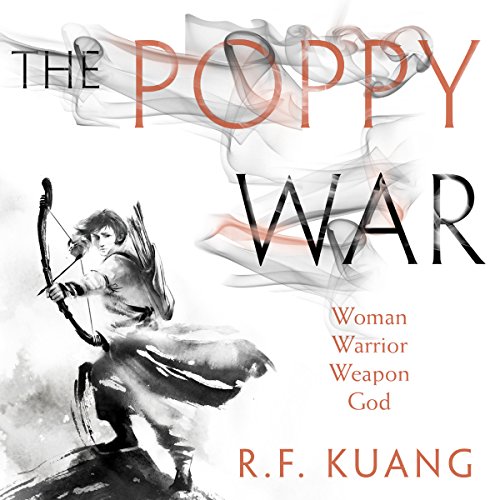
Review #1
The Poppy War (The Poppy War #1) audiobook free
First the good parts: – Solid, enjoyable world-building, with the competing philosophies of shamanism, the push towards modernization and conformity, and the historical ebb and flow of power and subjugation being the standouts. I found myself oddly intrigued by the history of martial arts. – The military portions, while exceedingly brutal (do NOT mistake this for YA and give it to your child — hell, even if you\’re an adult be prepared for graphic violence, including sexual), were a lot of fun. There\’s a mix of practical warfare, including chemical weapons and incendiary devices, with magical stuff that was honestly pretty engaging. – A common problem when you bring gods and magic into fantasy is \”Why is there any conflict if the characters are this powerful?\”. That is not present here. The consequences of trying this are shown, and they are BANANAS. It\’s great. – If you like characters who are allowed to be horrible people, then you will not be disappointed here. I saw another review that said the heroine seemed insane by the end. This is a feature, not a bug. Between the very graphic war crimes and what we learn of the human relationship to the gods it\’s amazing anyone is still remotely functional by the end. – You get to the end and it\’s like…wow. This can\’t end well. I consider this a plus. Weak points: – Did feel like the first book could have been condensed. The primary conflict didn\’t come into play until 40% of the way through, after which the military portion kicked in and carried it through to the end. (Oddly you could conceivably start with Book 2, since it even included its own prologue.) – The style may be hit-or-miss for some. It lacks the stuffy tone of Tolkien-esque Epic Fantasy, which I appreciate, but occasionally veers into Quippy Territory. Depending on your preference this may be a pro or a con. – Very particular point: May read a little weird if you\’re a Japanese-American. This is influenced by real atrocities committed during the Sino-Japanese War, so if you\’re not willing to think about that ugly bit of history just skip it entirely, but oddly what bothered me more was that the Japanese proxy race were described in the same generalized terms of hive-minded fanatical hordes that were used to describe Japanese-Americans during World War II. There\’s a touch at the very end that indicates the culture isn\’t uniform evil, but we never seen anything to challenge their depiction as anything but sadistic monsters. There are also some textual reasons to present them as one-dimensional, and it may be challenged in the second book. Obviously this didn\’t keep me from enjoying the book, and it may not bother others at all, but if you do happen to have this background and just wanted to settle down and enjoy some Asian-inspired SFF do not be thrown. All in all, a little bumpy but intriguing enough that I\’ll be checking out the sequel.
Review #2
The Poppy War (The Poppy War #1) audiobook in series The Poppy War
I was excited to dig into an Asian fantasy novel with Asian protagonists. Kuang is a polished writer and keeps her story moving along with minimal distractions. So even though there were many things I didn\’t enjoy about the novel, the writing kept me turning pages. I was invested in learning about the fate of Kuang\’s protagonists and learning the secrets of her magical world. Unfortunately, RF Kuang creates a fantasy world that borrows way too liberally from historical China. To begin with, the author doesn\’t even bother to give fantasy equivalents to many real-world people and places. The philosopher Men Zi (Mencius) appears as Men Zi in the story. Zhuang Zi is Zhuang Zi. Wu Dang Mountain (of martial arts fame) is Wu Dang mountain. Sun Zi\’s Art of War is featured prominently in the Book, almost completely unchanged from the real-world work. The author even repackages a famous real-world tale about Sun Zi training an army of concubines as her own creative work. The dialect of Kuang\’s fantasy capital might have come from a Lonely Planet Guidebook description about the Beijing dialect. Real-world historical events in modern Chinese history are all repackaged here: The Opium War, the Nanjing Massacre (the book is conspicuously dedicated to Iris Chang), Comfort Women, and even Unit 731. To her credit, Kuang does a better job of shoe-horning these historical events (compared to previous examples) into her fantasy world, but fictionalizing these incidents can also obfuscate these unresolved historical issues. For example, in her book, the Mugen (her analog to the Japanese) are vile, evil, automatons. To forward this narrative, she retells the story of the Opium Wars with the Japanese (instead of the British) as the main antagonists. This leads to an extremely unsatisfying explanation about the Mugen motives for committing genocide: they do it because they are brainwashed by their Emperor, and because they don\’t think of the Chinese (Nikara) as human. The reader\’s take-away from Kuang\’s fantastical retellings is \”hate is bad.\” This kind of simplistic, reductionist, and heavy-handed moralizing does little to honor the source material or the real life victims of Pacific War atrocities. Thus, as a scholar of Asian history, I feel that Kuang is very much out of her depth. She\’s like a novice piano player attempting a creative reinterpretation of a classic. Perhaps an audience unfamiliar with the original classic piece (e.g. a non-Asian audience) will be spellbound, but those familiar with the source material will be let down.
Review #3
Audiobook The Poppy War (The Poppy War #1) by R. F. Kuang
After reading several dud books in a row I looked up some recomendations for releases this year and The Poppy War rather stood out among them. It\’s a pretty good debut novel taking a lot of influence from chinese history and myths to create a unique fantasy world that really sucked me in initially though I finished the book with much more mixed feelings. The main protagonist is a teenage girl called Runin Fang or Rin for short. She is an orphan from a previous war whose uncaring opium dealing foster parents are trying to marry off to a much older man for their own gain. Rin\’s only chance is to enter the Keiju, a test held country wide to find the cream of the crop and send them to prestigious schools. Rin not only passes, she is first in her whole province sending her to Sineguard, the top military school in the whole of her country Nikara. The problem is she is an orphan with no money or standing and the other teenagers there are mostly sons and daughters of nobles who have been training for this their whole lives leaving Rin both behind and shunned by her new classmates. I loved this, it was like martial arts Harry Potter. The premise is great and Rin absolutely shines, you can feel her determination, her pain, tears and anger as she refuses to give up or be beaten no matter what is thrown at her. It was gripping, well written and I couldn\’t put it down. There are three acts to the book, that was act one, unfortunately the other two acts almost feel like they were written by different authors. Act two has the start of a war break out forcing the students to be drafted to fight. Rin suddenly becomes childish, petulant and kind of pathetic, she loses all her fire and just about every other character comes across as hugely unlikeable as well. I can certainly understand her finding actually fighting, killing and seeing friends die pretty taumatic but it\’s like she\’s a different person completely. The whole pacing despite there being a war on also just seems to slow down completely and act 3 becomes even worse with Rin making stupid decision after stupid decision following another character out of some crazy loyalty that is never really warranted from the actual content. She barely feels like the main character anymore, just a puppet following along, so different from the firey spirited girl at the start. The ending is extremely unfulfilling with Rin a shadow of the person she starts as, I just didn\’t really like her by the end of the book. The Poppy War also has a huge tone shift from the first third of the book with some extrememly over the top violence and rape descriptions that seem needlessly dark in it\’s descriptions. I saw another reviewer mention it being a reference to the Nanking massacre during world war II and I can certainly see that being the case but it feels so unneeded and didn\’t really add anything to the story to me. It\’s really frustrating because the start is absolutely excellent, the martial arts fights are exciting, Rin is developed well and I could feel myself really rooting for her with all the stuff coming her way, it was even emotional at times yet by the end I just didn\’t really care about her or what happened. I don\’t feel bad I read it but I find it hard to recommend overall. It has great ideas but the book sadly just isn\’t consistant enough in it\’s tone or characters to keep the pacing or enjoyment going. + Martial arts Harry Potter. + The first third of the book is fantastic. – Act 2 and 3 are disapointing in their tone shift and character personality shift. – Ending was terrible.
Review #4
Audio The Poppy War (The Poppy War #1) narrated by Emily Woo Zeller
Before I start my review I will warn you that this book is not for those faint of heart. Not your typical YA fantasy, you should proceed with caution if you are sensitive to scenes of Drug-abuse, self-harm, rape, war, torture, genocide and racism. Most of this is described graphically and I would certainly make yourself aware of this before reading. This was one of those books that hooks you from the first chapter and stays with you long after you have finished it. Filled to the brim with action, and with a heroine you\’re not sure is a hero or a villain, the twists and turns of this book are sure to keep you hooked until the very last page. I only recently found out that this draws inspiration from the Second Sino-Japanese war and the Rape of Nanking, and I love, though am slightly disturbed that this takes inspiration from real life events. I always enjoy a brilliantly written literary school and the Sinegard was no exception. Described as the elite military school in Nikan, which only accepts sons and daughters of members of the nobility, until Rin. Despite all the trials that Rin faces at Sinegard, there is one saving grace in the Master of Lore Jiang ( who is a cupcake and I adore him!). He teaches Rin the basics of Shamanism, how to reach the Pantheon, and then how to cut herself off from the God\’s. which is the exact opposite from what Rin wants to learn. Rin is a beautifully written character, she has the best of intentions, but her thirst for revenge is what eventually takes over, and drives her down the path of the Phoenix God. Though not necessarily a \”hero\” you cant help but feel that Rin\’s choices are made from the heart and with the best of intentions, she simply feels that there is no other way to exact her revenge. Altan is the reason for Rins choices and the main director of the path she takes. A boy that has had so much taken away from him, and far too much power given to him. He feels wholly the pain of the destruction of Speer, and the weight of being the last Speerly, until that is, he meets Rin. Together they make a hugely powerful team, however, there are those who believe them unnatural and unholy who would seek to ultimately destroy them. This book is split into thee parts. Part one is mainly focused on Sinegard and Rins first year at the academy, learning who her supposed enemies and friends are. Part two focuses more on her training with Jiang and the initial onslaught of the Mugen heralding the start of the third Poppy War. Part three follows Rin as she is eventually put to use in battle under her commander Altan, and her realisation that everything she thought she knew can be turned upside down. This was an easy 5/5 for me. I loved everything from the plot, the character and the world that Kuang builds. A must read for anyone looking for a dark and gritty Fantasy novel, with characters whose decisions don\’t always fall on the side of good. Though please do take note of the trigger warnings before reading.
Review #5
Free audio The Poppy War (The Poppy War #1) – in the audio player below
I first heard about this book in the context of a controversy about it being marketed as YA when the author felt it was clearly adult. While theres nothing wrong with YA fantasy indeed, I read a lot of it I remember being really irritated on the authors behalf by this. Where themes and character ages are a bit borderline, I tend to feel that male authors works get labelled as adult, but female authors work gets classed as YA. Once I actually picked up the book though, Ive got to admit that for the first third, my overwhelming thought was that it did feel a bit YA after all. And not just that, but a bit clichd. This section revolves around a girl from a poor village studying hard and being accepted into an elite military academy. Inevitably, she has a tendency to be top of the class. Inevitably, more privileged students are awful to her. The writing and world building were great, and the pseudo-Chinese setting was refreshing, but it all felt a bit too much like something Ive seen numerous times before. I also found it a bit unbelievable that the main character did quite as well as she did. I felt like more moderate success would have been just as satisfying and helped me suspend disbelief. In the second third, the plot and the tone totally change. Instead of learning about war in a safe, theoretical manner, the MC and the other key characters are plunged into a brutal, bloody conflict with a neighbouring nation (which felt like a fantasy Japan). You certainly wouldnt call this part YA. Its very violent, with several quite disturbing scenes, and one standout horrifying one, in which a particularly sadistic occupation and massacre is described in pages and pages of horrifying detail. Im still torn over whether it was needlessly gratuitous or a brave attempt not to sugarcoat the horrors of war. It was certainly memorable either way! Violence aside, this section is also notable for its interesting use of military strategy. Even if I had to read some of it with my hands over my eyes, I found this section more original and intriguing. The final third, while maintaining the adult tone, feels different again. To some extent, the war recedes into the background, the stakes become more personal to the MC (albeit with global implications) and theres a move away from stark reality tinged with magic to full-on metaphysics. It was definitely the most unique part of the book, particularly when combined with the MCs increasing moral ambiguity (at best). Overall, an impressive but somewhat unbalanced and tonally inconsistent read.
Recommend Books
Audiobook09 player
If the audio player does not work, please report to us, we will fix it as soon as possible (scroll up a little you will find the "REPORT CONTENT" button).


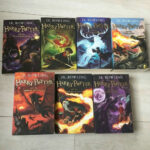

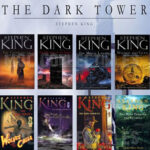
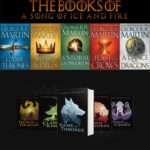
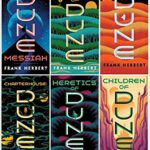
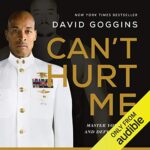




0 Comments: